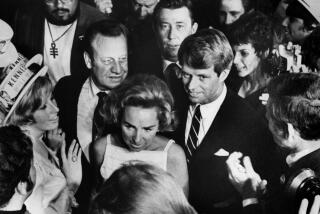COLUMN LEFT : Why Bother to Conspire Against J.F.K.? : Oliver Stone has bought into the fascist fantasy that Kennedy was a father-leader-hero.
Whether John F. Kennedy was killed by a lone assassin or by a conspiracy has about as much to do with the subsequent contours of American politics as if he had tripped over one of Caroline’s dolls and broken his neck in the White House nursery.
Many people think otherwise, reckoning that if it can be demonstrated that the Warren Commission was wrong and Oswald not the lone killer, then we are faced with the reality of a rightist conspiracy successfully engineered to change the course of history.
Among them is Oliver Stone, who definitely adopts the view that a right-wing conspiracy came to fruition on Nov. 22, 1963. He sets forth the motive of the conspirators thus: “Kennedy was moving to end the Cold War and sign a nuclear treaty with the Soviets; he would not have gone to war in Southeast Asia. He was starting a back-door negotiation with Castro.” And therefore there was “the first coup d’etat in America.”
In “JFK,” Stone leaves no doubt about the coup’s sponsors. A sequence in grainy black-and-white news film, presumably designed for extra verite, shows L.B.J. coordinating plans for the assassination with the Joint Chiefs of Staff. So Stone has really made a $40-million equivalent of Barbara Garson’s 1960s satire, “MacBird,” though Stone’s model is a different Shakespeare play.
As the Jim Garrison character says in the movie: “We have all become Hamlets in our country, children of a slain father-leader whose killers still possess the throne. The ghost of John Kennedy confronts us with the secret murder at the heart of the American dream.”
In its fascist yearning for the “father-leader” taken from the “children-people” by conspiracy, this speech accurately catches the crippling nuttiness of what passes in many radical circles for mature analysis and propaganda: that virtue in government died at Dallas and that, ever since, a “secret agenda” has perverted the national destiny.
With this demented optic, left ultimately joins hands with right. Just as the right-wing populists and Birchers see a secret conspiracy--Bilderberg, the Trilateral Commission, the Freemasons, the bankers, the Jews--at the heart of the state’s proceedings, so too do many on what passes for the left, though the ascribed nature of the conspirators sometimes differs. The assassination of J.F.K. powerfully fueled this tendency. Many are the meetings I’ve addressed on the open secrets and agenda of American capitalism in our time, only to be lectured from the floor about the impossibility of an authentic politics emerging in America until the conspiracy at Dallas is revealed. Stone is tapping into a mother lode of historical paranoia.
“Get a life,” Captain Kirk once told some Trekkies. Get some history, too. Tom Wicker fretted in the New York Times that “in an era when mistrust of government and loss of confidence in institutions (the press not least) are widespread and virulent, such a suggestion (that representatives of the ruling elites murdered J.F.K.) seems a dubious public service.” In fact, the dubious public service is to suggest that J.F.K. himself was not a functional representative of those elites.
The real J.F.K. presided over a vast military buildup, backed a military coup in Guatemala, denied the Dominican Republic the possibility of land reform, helped promote a devastating cycle of Latin American history and backed a Ba’athist coup in Iraq. J.F.K. presided over Operation Mongoose, inflicting terror upon Cuba. Even as bullets brought J.F.K.’s life to its conclusion in Dallas, a CIA officer operating firmly within the bounds of J.F.K.’s policy was handing poison intended to assassinate Fidel Castro to a Cuban agent in Paris.
Lawrence J. Bassett and Stephen Pelz wrote in the 1989 collection, “Kennedy’s Quest for Victory,” that “by putting American advisers in harm’s way . . . he helped to engage American patriotism in a war against the Vietnamese people. By arguing that Vietnam was a test of the West’s ability . . . and a test of American credibility in the Cold War, he raised the costs of withdrawal for his successor.”
J.F.K. sent in 16,000 advisers, sponsored the “strategic hamlet” program, launched napalm and defoliation upon the South and covert terror and sabotage upon the North. He never entertained the possibility of a negotiated settlement.
Thomas Paterson, the editor of this same volume, put it well. History forces us to “reckon with a past that has not always matched the selfless and self-satisfying images Americans have of their foreign policy and of Kennedy as their young, fallen hero who never had a chance. Actually, he had his chance, and he failed.”
More to Read
The biggest entertainment stories
Get our big stories about Hollywood, film, television, music, arts, culture and more right in your inbox as soon as they publish.
You may occasionally receive promotional content from the Los Angeles Times.










